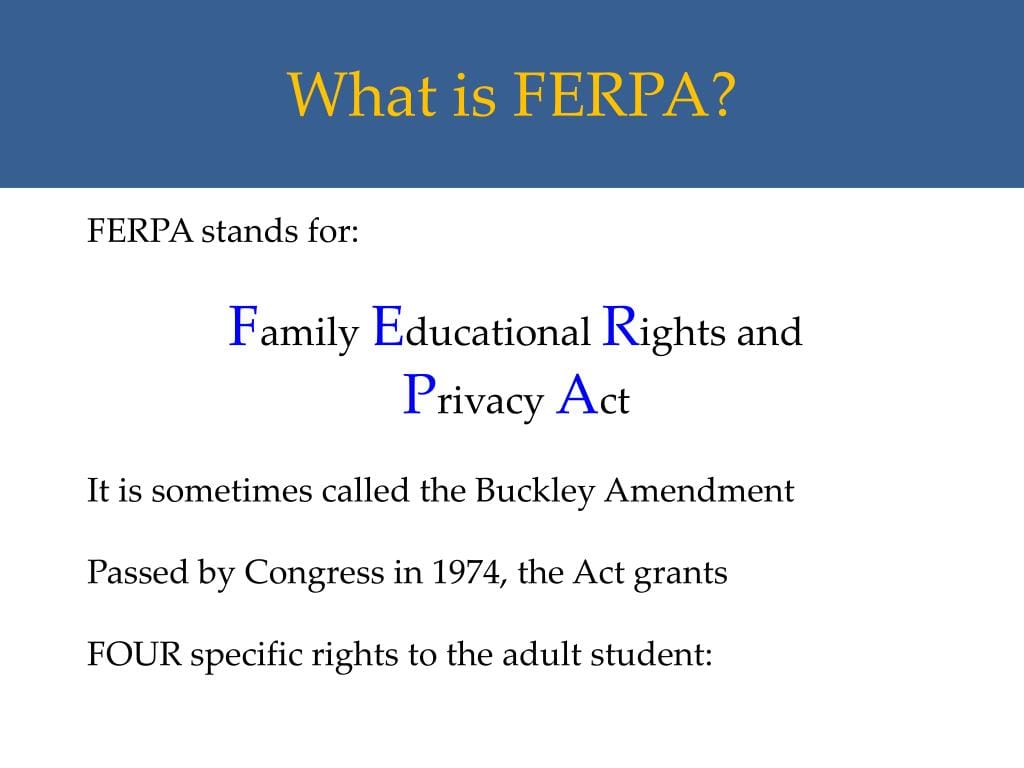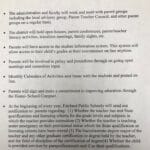Understanding the Family Educational Rights and Privacy Act (FERPA) is crucial for navigating the educational landscape and advocating for student privacy. This guide breaks down FERPA’s key components, empowering parents and eligible students to control access to educational records, ensuring privacy and accuracy.
What is FERPA? Protecting Student Information
FERPA, also known as the Buckley Amendment, is a federal law enacted in 1974 to safeguard sensitive student information from unauthorized disclosure. It applies to all educational institutions (public and private, K-12 and post-secondary) that receive funds from the U.S. Department of Education. Think of FERPA as a lockbox for your child’s school information, with you holding the key. It’s designed to keep a student’s personal and academic life confidential.
Your FERPA Rights: Access, Amendment, and Control
FERPA grants parents and eligible students (those 18 or older or attending a postsecondary school) three fundamental rights:
Right to Access: You have the right to inspect and review your or your child’s education records. This includes report cards, transcripts, disciplinary records, and more. Imagine it like checking your credit report – it’s your information. Our figurative language finder can help you understand the comparison better.
Right to Amend: If you find something inaccurate or misleading in the records, you can request corrections. This isn’t about changing grades but ensuring the record reflects reality. It’s like correcting a typo – crucial for accuracy.
Right to Control Disclosure: You control who else sees your or your child’s records, except in specific situations. Want to share transcripts with a college? You can. Want to keep certain information private? FERPA helps you do that. This control empowers you to protect your privacy.
When Can Schools Share Information? FERPA Exceptions
While FERPA emphasizes privacy, there are exceptions when schools can share information without explicit consent:
Directory Information: Basic information like name, address, phone number, date of birth, and major can be shared unless you opt out. Think of this as the information you might find in a yearbook.
Legitimate Educational Interest: School officials, such as teachers, administrators, and counselors, can access records if they have a genuine need to know for educational purposes. This could include advising on course selection or providing academic support.
Health and Safety Emergencies: In crisis situations, schools can share information necessary to protect your or your child’s health and safety, or the safety of others.
Judicial Orders and Subpoenas: Schools must comply with court orders requiring the release of records. This is a legal obligation that supersedes FERPA’s general privacy protections.
Audits and Evaluations: Authorized audits and evaluations of educational programs may require access to student records.
Waiving Your Rights: FERPA Waivers and College Applications
Students can waive certain FERPA rights, often for college applications. This allows schools to share information like teacher recommendations. Waiving these rights should be carefully considered, as it impacts your privacy. For a visual understanding of waivers and how they connect to other legal concepts, you might find our figurative language anchor chart helpful. It can aid in grasping abstract concepts through comparison.
Who Enforces FERPA? Ensuring Compliance
The U.S. Department of Education’s Family Policy Compliance Office (FPCO) enforces FERPA. Violations can lead to consequences, including the loss of federal funding, demonstrating the seriousness with which the government takes student privacy.
FERPA in California: Additional State Protections
California supplements FERPA with its own student privacy laws, offering additional safeguards, especially in the digital age. These laws address issues like online activity, targeted advertising, and data breaches, providing a more robust layer of protection.
FERPA in the Digital Age: Evolving Challenges
The rise of online learning platforms and increased use of technology in education present new challenges for FERPA. Ongoing research and debate address how best to protect student privacy in this evolving landscape. This includes considerations about data breaches and the ethical use of student data.
The Student Perspective: Owning Your Information
FERPA is not just for parents. As students transition to adulthood, understanding and exercising their FERPA rights becomes crucial for managing their educational records and protecting their privacy.
Frequently Asked Questions (FAQ)
Q: What if I disagree with information in my child’s record?
A: You can request an amendment. If the school denies the request, you have the right to a hearing.
Q: What is “directory information,” and how can I opt out?
A: Directory information includes basic identifying information. Contact your school for their opt-out procedure.
Q: Does FERPA apply to private schools?
A: Yes, if the private school receives funds from the U.S. Department of Education.
Q: How can I learn more about FERPA?
A: The U.S. Department of Education website (20 U.S.C. § 1232g; 34 CFR Part 99) provides detailed information about FERPA.
By understanding FERPA, you can actively participate in protecting your or your child’s educational privacy. This knowledge empowers you to navigate the educational system confidently and advocate for your rights. Remember, staying informed is key, and consulting with your school or an educational advisor can provide further clarity and support. This information is for educational purposes and does not constitute legal advice.
- Unlock Elemental 2 Secrets: Actionable Insights Now - April 2, 2025
- Lot’s Wife’s Name: Unveiling the Mystery of Sodom’s Fall - April 2, 2025
- Photocell Sensors: A Complete Guide for Selection and Implementation - April 2, 2025
















